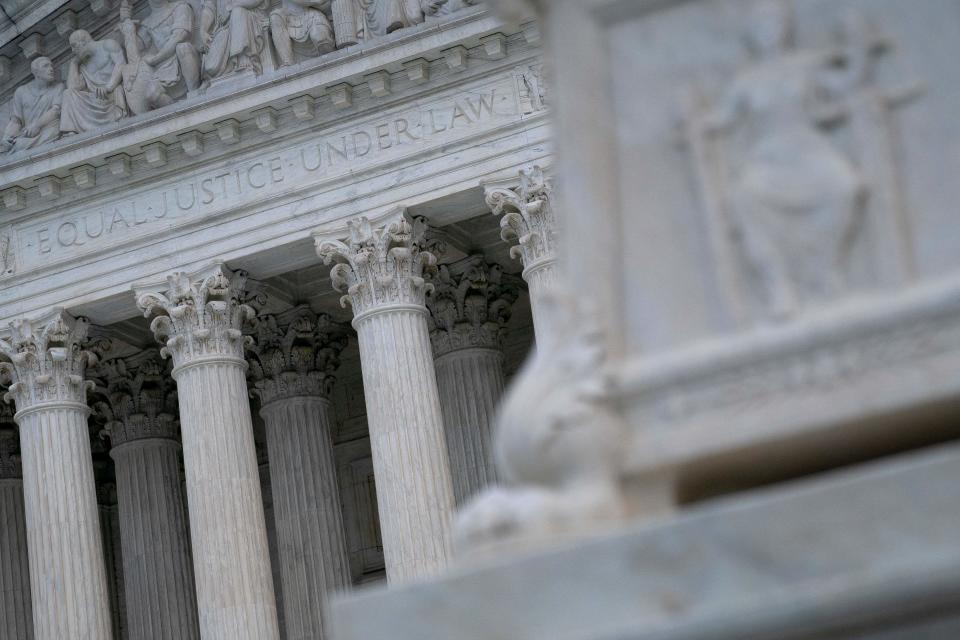Stalking or free speech? Critics say Supreme Court just made it harder to stop stalkers
- Oops!Something went wrong.Please try again later.
WASHINGTON – The Supreme Court on Tuesday sided with a man convicted of stalking after he sent hundreds of Facebook messages to a musician in Colorado she viewed as "creepy," drawing criticism from some advocates who said the decision would make it harder to convict people for similar behavior.
The appeal from Billy Counterman asked the Supreme Court to decide what constitutes a "true threat" that can be prosecuted as a crime versus what types of menacing language is protected. In a 7-2 decision, the Supreme Court ruled that the standard prosecutors in Colorado used to convict Counterman violated the First Amendment.
Counterman claimed he did not intend to threaten the musician, Coles Whalen, with his messages. The Supreme Court's decision tosses his conviction but leaves open the possibility that prosecutors could try again under the more rigorous standard. The court said prosecutors must show a defendant acted recklessly, meaning the person "disregarded a substantial risk that his communications would be viewed as threatening."
"The state had to show only that a reasonable person would understand his statements as threats. It did not have to show any awareness on his part that the statements could be understood that way," Justice Elena Kagan wrote for the majority, recapping how prosecutors approached the case. "That is a violation of the First Amendment."
The decision drew criticism from Colorado Attorney General Phil Weiser, who said it would make it "more difficult to stop stalkers from tormenting victims."
Mary Anne Franks, a law professor at the University of Miami, wrote on Twitter that the decision "just decreed that stalking is free speech protected by the First Amendment if the stalker genuinely believes his actions are non-threatening. That is, the more deluded the stalker, the more protected the stalking."
Some of Counterman's messages were laden with profanity, and others suggested he had sought the musician out in public.
"Was that you in the white Jeep?" one of the messages read. "You're not being good for human relations. Die. Don’t need you," read another. "Seems like I'm being talked about more than I’m being talked to. This isn't healthy," Counterman wrote in another.
Case tracker: Race, religion and debt: Here are the biggest cases pending at the Supreme Court
“Staying in cyber life is going to kill you," Counterman wrote at one point. "Come out for coffee. You have my number."
After Whalen secured a protective order in 2016, Counterman was arrested on charges of stalking under a Colorado law that bars "knowingly ... repeatedly" making any form of communication with another person that "would cause a reasonable person to suffer serious emotional distress." The trial court ruled that his messages constituted a "true threat" and therefore didn't deserve protection under the First Amendment.
A jury convicted Counterman, and he was sentenced to 4½ years in prison.

Several First Amendment advocates applauded the decision.
"We're glad the Supreme Court affirmed today that inadvertently threatening speech cannot be criminalized," said Brian Hauss, senior staff attorney with the American Civil Liberties Union's Speech, Privacy, & Technology Project. “In a world rife with misunderstandings and miscommunications, people would be chilled from speaking altogether if they could be jailed for failing to predict how their words would be received."
Counterman acknowledged that his messages were "annoying" and "weird." But he argued that, in determining whether he was guilty of stalking, courts should have considered whether he intended the messages to be threatening. A state appeals court in Colorado upheld Counterman's conviction in 2021 under a different standard: that a person could "reasonably perceive" that the threats were serious.
Justice Amy Coney Barrett wrote in dissent that the court's decision "unjustifiably grants true threats preferential treatment." Counterman, Barrett wrote, "knew what the words meant."
David Brody, managing attorney of the Digital Justice Initiative with the Lawyers' Committee for Civil Rights Under Law, said the court's opinion attempted to find a compromise. But, Brody said, the "reckless" standard would make it "more difficult to combat online harassment and other attacks that intimidate people from participating in public life."
This article originally appeared on USA TODAY: Critics say Supreme Court ruling will make it harder to nab stalkers
